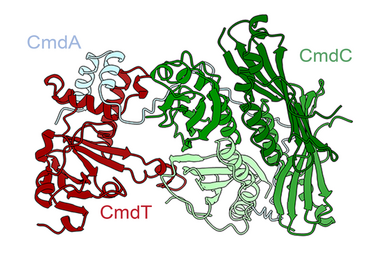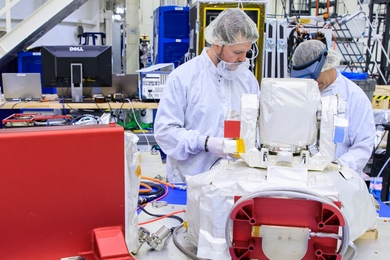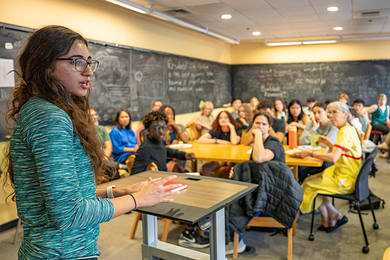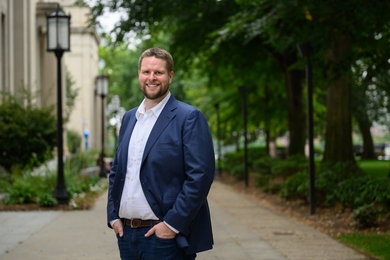Integrating smart systems into manufacturing offers the potential to transform many industries. Lam Research, a founding member of the MIT.nano Consortium and a longtime member of the Microsystems Technology Lab (MTL) Microsystems Industrial Group, explored the challenges and opportunities smart systems bring to the semiconductor industry at its annual technical symposium, held at MIT in October.
Co-hosted by MIT.nano and the MTL, the two-day event brought together Lam’s global technical staff, academic collaborators, and industry leaders with MIT faculty, students, and researchers to focus on software and hardware needed for smart manufacturing and process controls.
Tim Archer, president and CEO of Lam Research, kicked off the first day, noting that “the semiconductor industry is more impactful to people's lives than ever before."
“We stand at an innovation inflection point where smart systems will transform the way we work and live,” says Rick Gottscho, executive vice president and chief technology officer of Lam Research. “The event inspires us to make the impossible possible, through learning about exciting research opportunities that drive innovation, fostering collaboration between industry and academia to discover best-in-class solutions together, and engaging researchers and students in our industry. For all of us to realize the opportunities of smart systems, we have to embrace challenges, disrupt conventions, and collaborate.”
The symposium featured speakers from MIT and Lam Research, as well as the University of California at Berkeley, Tsinghua University in Beijing, Stanford University, Winbond Electronics Corporation, Harting Technology Group, and GlobalFoundries, among others. Professors, corporate leaders, and MIT students came together over discussions of machine learning, micro- and nanofabrication, big data — and how it all relates to the semiconductor industry.
“The most effective way to deliver innovative and lasting solutions is to combine our skills with others, working here on the MIT campus and beyond,” says Vladimir Bulović, faculty director of MIT.nano and the Fariborz Maseeh Chair in Emerging Technology. “The strength of this event was not only the fantastic mix of expertise and perspectives convened by Lam and MIT, but also the variety of opportunities it created for networking and connection.”
Tung-Yi Chan, president of Winbond Electronics, a specialty memory integrated circuit company, set the stage on day one with his opening keynote, “Be a ‘Hidden Champion’ in the Fast-Changing Semiconductor Industry.” The second day’s keynote, given by Ron Sampson, senior vice president and general manager of US Fab Operations at GlobalFoundries, continued the momentum, addressing the concept that smart manufacturing is key to the future for semiconductors.
“We all marvel at the seemingly superhuman capabilities that AI systems have recently demonstrated in areas of image classification, natural language processing, and autonomous navigation,” says Jesús del Alamo, professor of electrical engineering and computer science and former faculty director of MTL. “The symposium discussed the potential for smart tools to transform semiconductor manufacturing. This is a terrific topic for exploration in collaboration between semiconductor equipment makers and universities.”
A series of plenary talks took place over the course of the symposium:
- “Equipment Intelligence: Fact or Fiction” – Rick Gottscho, executive vice president and chief technology officer at Lam Research
- “Machine Learning for Manufacturing: Opportunities and Challenges” – Duane Boning, the Clarence J. LeBel Professor in Electrical Engineering at MIT
- “Learning-based Diagnosis and Control for Nonequilibrium Plasmas” – Ali Mesbah, assistant professor of chemical and biomolecular engineering at the University of California at Berkeley
- “Reconfigurable Computing and AI Chips” – Shouyi Yin, professor and vice director of the Institute of Microelectronics at Tsinghua University
- “Moore’s Law Meets Industry 4.0” – Costas Spanos, professor at UC Berkeley
- “Monitoring Microfabrication Equipment and Processes Enabled by Machine Learning and Non-contacting Utility Voltage and Current Measurements” – Jeffrey H. Lang, the Vitesse Professor of Electrical Engineering at MIT, and Vivek R. Dave, director of technology at Harting, Inc. of North America
- “Big and Streaming Data in the Smart Factory” – Brian Anthony, associate director of MIT.nano and principal research scientist in the Institute of Medical Engineering and Sciences (IMES) and the Department of Mechanical Engineering at MIT
Both days also included panel discussions. The first featured leaders in global development of smarter semiconductors: Tim Archer of Lam Research; Anantha Chandrakasan of MIT; Tung-Yi Chan of Winbond; Ron Sampson of GlobalFoundries; and Shaojun Wei of Tsinghua University. The second panel brought together faculty to talk about “graduating to smart systems”: Anette “Peko” Hosoi of MIT; Krishna Saraswat of Stanford University; Huaqiang Wu of Tsinghua University; and Costas Spanos of UC Berkeley.
Opportunities specifically for startups and students to interact with industry and academic leaders capped off each day of the symposium. Eleven companies competed in a startup pitch session at the end of the first day, nine of which are associated with the MIT Startup Exchange — a program that promotes collaboration between MIT-connected startups and industry. Secure AI Labs, whose work focuses on easier data sharing while preserving data privacy, was deemed the winner by a panel of six venture capitalists. The startup received a convertible note investment provided by Lam Capital. HyperLight, a silicon photonics startup, and Southie Autonomy, a robotics startup, received honorable mentions, coming in second and third place, respectively.
Day two concluded with a student poster session. Graduate students from MIT and Tsinghua University delivered 90-second pitches about their cutting-edge research in the areas of materials and devices, manufacturing and processing, and machine learning and modeling. The winner of the lightning pitch session was MIT’s Christian Lau for his work on a modern microprocessor built from complementary carbon nanotube transistors.
The Lam Research Technical Symposium takes place annually and rotates locations between academic collaborators, MIT, Stanford University, Tsinghua University, UC Berkeley, and Lam’s headquarters in Fremont, California. The 2020 symposium will be held at UC Berkeley next fall.













